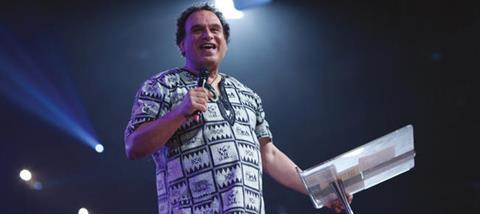Let’s be honest, Mike Pilavachi is a youth ministry legend who needs little introduction. The author, youth worker and leader and founder of Soul Survivor has influenced the lives of countless young people over the last three decades. He sat down with Jamie Cutteridge to talk about his and Andy Croft’s new book Everyday supernatural, the current state of youth ministry and the last quarter-decade of Soul Survivor

JC: When you and Andy (Croft) released Everyday supernatural, there was some research accompanying it: two in three people said they had experienced a personal encounter of the supernatural, with more than half experiencing that in the last year and a quarter in the last week. What surprised you most from the research? Was the book written for the two-thirds who have had supernatural experiences, or the third who have not?
MP: It surprised me how many Christians say they have regular spiritual encounters. We wrote the book for both groups. My heart is for the traditional church and the conservative evangelical church and I long to see them coming to these things. We’ve been massively influenced by the values of the early Vineyard movement and they’re very Quaker-y values actually - it’s not about the guy on the stage, it’s about everyone: we all wait on the Lord - all of that comes from the Quakers. And I think that there’s a spirituality from that stream of the Church that really needs to be rediscovered, because so much of our Christianity is muscular Christianity. Whether it’s an evangelical muscular Christianity or a social-activist muscular Christianity or a charismatic, Pentecostal muscular Christianity - you name it, you claim it, you go through your battle. I actually think that there is a place for many, many people to say: “Lord, you lead, we’ll follow”.
There’s the Mark 5 and the John 5; you put them together. In Mark 5 there was the woman who had been bleeding for 12 years who reached out and touched Jesus - there’s the Armenian approach to charismatic church, which is to reach out, touch him, you respond. Then there’s John 5, which is the pool of Bethesda. Jesus goes there there are so many crippled, blind people, and he picks out the one guy who’d been crippled for 38 years. At the end he explains himself in that chapter and says: “I only do what I see my father doing”. They’re both in scripture because there’s a place for both. But I think we’ve emphasised the first at the expense of the second. And what I’d love to do is to show the traditional church and the more conservative church, evangelical church, that actually you can do these things without hype, without manipulation, without exaggeration I hope, and in a naturally supernatural way - in a way that’s just normal. And that’s what we’ve tried to do in the book, and that’s what we’ve tried to model in the church and at the festivals.
You don’t need to wait until you’re sorted before you serve
Of course at the festivals it’s a little bit different, because if you get 8,000 teenagers in a tent, twice a day for five days, you’re going to get some hype. There’s nothing you can do about that. But we want to model a responsible leadership where we say: the people at the front, if you want to put it like that, they’re God’s responsibility; he’s meeting with them. My responsibility that he gives me is the people at the back. I’ve got to pastor them and look after them. Just being honest can be really powerful - is all of this God? No, human beings are involved, of course it’s not all God. It’s our response to God, and maybe one or two of us are trying to help him out. You know, when sometimes the laughing starts, are we going to say: “No, that’s just you, stop it’? No, we want to live with some mess and acknowledge that not everything is going to be [God]. We have this saying: “It’s messy in the nursery, it’s neat and tidy in the graveyard”. We want the mess of the nursery where there’s new life; sometimes it causes more pastoral issues than a neat and tidy graveyard where we’re completely in control.
JC: I’ve been to a lot of charismatic meetings and movements, but it feels like there aren’t many places that are as willing to be honest about the ‘weird stuff’ as you guys. Was that a bit of a learning curve?
MP: It comes out of my history, to be honest. The truth is, I don’t make it up when I say sometimes we don’t know; I’ll say to Andy or the others: “What on earth do you think’s going on?” And there have been times when I’ve had to call some others up and say: “Listen, how much of this do you think is Jesus and how much is hype. Do I put a stop to this, do I let it go?” We want to be responsible.
I had an incident when I was a student at Birmingham University that was huge for me. There was a Pentecostal healing evangelist who came and did this crusade in the old Bullring, a huge building. I sat near the back and it was a lot of hype and there was a lot of: “Come on, come on, have faith, trust in Jesus, be healed, come to the Lord”. There was this guy sitting in front of me with no legs, in a wheelchair and the evangelist said: “Now, I want you in wheelchairs, by faith, to stand up. Stand up if you’re in a wheelchair”. And I sat there and I watched his two friends lift him up and this guy was moving his stumps as fast as he could, he was getting red-faced and he was moving his stumps until he was exhausted. And of course, his stumps didn’t grow. And then after a while they got some people up with their empty wheelchairs. And then his friends put this guy down; they were embarrassed. And then the meeting just suddenly finished, bizarrely. And everyone started leaving and the guy’s friends left, and he was there, sitting there in the wheelchair on his own. I’ll never forget it. I sat there watching and he sat there recovering, a bit short of breath, and then he sat there just staring. And then after a while he just turned and started wheeling his wheelchair and left. And to this day, I regret that I didn’t go up to him and say: “It’s ok”. And I thought then - and I’m a card carrying charismatic, Pentecostal, tongue-speaking everything - I thought then, I never ever want to have anything to do with anything as ugly as that. That was ugly. And I’m not saying that evangelist wasn’t a sincere Christian, but that was ugly.
We came across the early Vineyard teaching, which was all about integrity. It was like: “ah, I’ve come home. This is who I am. I’m home at last”. Because the only models that I had up until that time was what could come across as very hypey-charismatic - extreme charismatic - or a rigid, very conservative, very controlling, very negative evangelicalism. And I didn’t recognise myself in either. And when we started Soul Survivor, it was to reach young people - because I love young people - but it was also to try and model values and a culture that is: we’re not going to take ourselves seriously, but we’ll take Jesus seriously. We’re not going to be weird, but God’s allowed to be as weird as he wants. And if we get it wrong, we’re going to say we got it wrong. If we don’t know, we’re going to say we don’t know, and we’re going to build community and family. This year, I said at every single festival until I was blue in the face: “If you’re not feeling anything, we’re not feeling anything. It’s ok. We don’t have to do what anyone else is doing. If you’re on a journey, you be yourself.”
There’s a spirituality from the Quakers which needs to be rediscovered: so much of our Christianity is muscular Christianity
We’re starting a ‘Naturally Supernatural’ conference next summer, because want to encourage the whole church. We’ve won the charismatic battle but we’ve lost the charismatic war. Loads of churches believe in the gift of tongues but how many Christians pray in tongues every day? Loads of churches believe in healing, but how often do we pray for healing?
JC: What role does youth ministry have to play in this? How does the festival experience translate to small youth groups?
MP: That’s where we started. I’ve had a home group in my house for years. Well, at the moment, we meet five houses down from my house. We do Bible study and we pray for each other. We would have a season of taking it in turns to pray for each other, and we’ll have someone in the ‘hot seat’. We gather round, lay hands on them and we’ll ask the Lord to meet with them and ask the Lord to give us any words. We pray for them and people just have the simplest words. Not everyone rings true completely, but people are always blessed and encouraged.
My old boss David Pytches used to say to us: “After you’ve prayed for someone, if they leave knowing nothing else they should at least leave knowing they’ve been loved”. So we pray, we leave the results to God, but if 15 of us are praying for this one person, for 15-20 minutes, they know they’re loved.
JC: Is that part of the reason for the Naturally Supernatural festival next summer, in that you’re trying to create a culture within churches where this is the norm?
MP: Exactly: for the young peoples’ sake and for the youth leaders’ sake. In our SoulNet seminars this summer, the youth workers’ biggest struggle is with their church not their youth group. It’s not healthy if the youth group ends up with a different culture than the rest of the church. I want us to serve the whole church and give them a model and a values system within which the supernatural can function in a way which doesn’t damage people, and has integrity.
JC: What were the things that struck you or surprised you among young people this summer?
MP: The pain. My dear friend Andy [Croft] did two talks, and they were both superb. The first one was on anxiety and worry; a few months ago he got anxious and worried and stressed and we gave him time off work. He got some counseling, he saw a doctor. And he started to work at the cause and it was his perfectionism - his driving success he calls love. And I mean honestly, if you listen to his talk it was incredible. For the ministry time we got up and I just said: “Now we all get anxious, we all worry. I’m not going to invite you to come forward if you get anxious or worried. But if it’s killing you - if anxiety and all of those things are strangling you and it’s ruining your life and it is this major thing and you’re at the end of yourself - could you be brave, stand up and come forward.” It was packed: the whole front of the tent, going in the aisles virtually to the back of the tent. Every single time, every single festival… and it was like: what the hell is going on? What is happening? Half the battle was won simply by them coming forward, because I could say to them: “Just look around. Do you see you’re not on your own? It’s been so lonely. You’re not on your own.” And I could say to the rest: “Let’s be family, the rest of us, why don’t we pray for our friends? Come on, let’s gather around and let no one be on their own.”
At Soul Survivor C, where I reckon we might have had as many as 20 per cent non- Christians, on the morning of day four, for the first time, the lady who oversees our connect team - our social workers, police, doctors etc - sent us a message saying: “Please, please, please do not have any more calls for emotional things. We’re beyond ourselves. For the sake of the kids and for the sake of my team, we’re at breaking point.” That’s the first time this has happened. They were literally writing out reports at three o’clock in the morning, having been inundated with kids.
It’s not healthy if the youth group ends up with a different culture to the rest of the church
So on one level it’s the brokenness. But there’s also the whole consumer Christianity thing - it’s a battle. In the worship, I kept talking with Tom [Smith] and Beth [Croft] and saying: “Please, let’s make sure we don’t just dance, dance everybody dance. But that we have songs with content, songs that are intimate, songs that are about Jesus.” The big issue for all of us is how do we disciple a generation of Christians in a consumer culture? It is such a battle every festival to get to the place where it’s not about us. That’s why towards the end it’s like now we begin to ask: what are you called to? What would you love to do to serve Jesus? What would you love to do for other people? We always want to put the whole mission thing front and centre. We took hundreds of kids each day into Stafford to serve alongside the churches. And we’re looking at other missions, we’re going to restart doing missions, because you don’t need to wait until you’re sorted before you serve. If I waited I’d still be waiting. We get sorted as we go.
JC: What shifts have you noticed among youth workers over the last 25 years?
MP: Generally, the quality of youth workers has gone down dramatically. I love the Anglican Church but lots of our best youth leaders are now getting ordained and I begged the Archbishop - I went and saw him, and asked: “Please could you establish a diaconate for youth leaders?” We’ve just got to raise the profile of that, otherwise it’s like you do youth work for three years until you’ve practiced with the little people and then you do the proper ministry. We’ve got to break that.
Honestly, loads of youth leaders don’t even know what they believe. And they’re petrified of looking at certain issues - especially sex and sexuality. The numbers of youth leaders after we did a series of talks on sex and relationships who said: “Thank you for doing that because we can’t talk about it”. Really? I asked this years’ Soul61s, which is our discipleship year - there are 25 of them and they’re the ones that raised £6,000 each to spend ten months with us so they’re pretty committed - I asked them back in January: “How many of you have never talked about sex and sexuality in your youth group?” Half put their hands up. Half!
JC: If you look back over the last quarter-decade of Soul Survivor, what would you do differently?
MP: I wish we’d taught more of the Bible in the early days. Now, with our Bible in a year and our youth Bible, we try and base what we do on the Bible as much as possible. But initially we didn’t do that for a long time; we didn’t even realise that we didn’t do it. We now have a biblically illiterate generation.
JC: And those young people are now youth workers…
MP: Yes, that’s exactly it. My heritage, when I became a Christian, was: Christian university, Christian union, Banner of Truth books, Watchman Nee’s Normal Christian life; I remember arguing with my friend on the train about what Watchman Nee really meant in chapter five! And that doesn’t happen anymore.
One of my weaknesses is that I want people to like me and I want to please. And so sometimes I would default to humor and telling funny stories at the expense of telling biblical stories. And I wish I hadn’t done that so much; I wish I’d done that less. I really, really do.
But my greatest joy now, honestly, is that I’m at the age where I keep having people coming to me and telling me stories. I had this one couple at week C; they came up to me and said: “We just want you to know that we both became Christians at Soul Survivor. One of us eight years ago, the other one eleven years ago. We’re now, as a married couple, youth leaders in our church and we’ve brought the youth group and some of our youth group came forward to become Christians like we did.” And things like that make you want to cry.








































